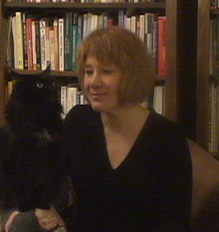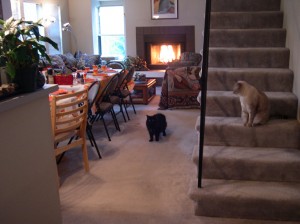Plan Ahead for Holiday Communications

Talk Hear Love
By Cat Wilson
In our human nature, perhaps when something happens and we’re not prepared, we can say things we wish we could take back. Have you ever wondered how to talk to your partner? Do arguments pop up and you wish you’d said something different? Let me share an opportunity.
When I first met Rich, he gave me a book The Four Agreements by Don MIguel Ruiz. This, I thought, was his way of creating a conversational opener. The book had some guidelines about taking responsibility for actions, listening, acknowledging another person, and recognizing that we’re human. It was a small book and I read it quickly, enjoying the stories of relationships and learning a higher message. If you haven’t read it, it’s a quick and enjoyable read!
Several days later, he asked me, “Did you like the book?” “Yes! I loved it!” I exclaimed. I actually had a hard time putting it down, and found myself reading it all the way through. It opened my mind, my heart and my way of being with other people changed.
The Four Agreements are:
1. Be Impeccable with your Word: Speak with integrity. Say only what you mean. Avoid using the Word to speak against yourself or to gossip about others. Use the power of your Word in the direction of truth and love.
2. Don’t Take Anything Personally
Nothing others do is because of you. What others say and do is a projection of their own reality, their own dream. When you are immune to the opinions and actions of others, you won’t be the victim of needless suffering.
3. Don’t Make Assumptions
Find the courage to ask questions and to express what you really want. Communicate with others as clearly as you can to avoid misunderstandings, sadness and drama. With just this one agreement, you can completely transform your life.
4. Always Do Your Best
Your best is going to change from moment to moment; it will be different when you are healthy as opposed to sick. Under any circumstance, simply do your best, and you will avoid self-judgment, self-abuse, and regret.
Little did I know that my response began our relationship. This was one of his checkpoints and later on I learned that it was the basis of whether he would continue seeing me. It was a book that had some guidelines so people could relate honestly, openly and with understanding and on a high level. When we relate with others on a high level we have a more loving and satisfying experience. This is what we both wanted.
 One day, a couple years ago, one of our cats yelped and cried for help. I dashed to the living room to find “Alpha Cat” Dancer pinning “Please Don’t Hurt Me Cat” Alexa down, and saw tuffs of her fur on the carpet. Grabbing Dancer by the scruff of the neck I yelled, “No!” Alexa took off to another room like a baseball pitched for a safe run. My partner took Dancer and scolded him. I went off to find Alexa and check on her to see if she was okay. In the corner of my office, sitting on my chair she sat shaking. I slowly walked up and spoke in a soothing voice to her, wanting to pet her and apologize for the other cat, who doesn’t normally beat her up. She clearly wanted to be alone and lick her wounds.
One day, a couple years ago, one of our cats yelped and cried for help. I dashed to the living room to find “Alpha Cat” Dancer pinning “Please Don’t Hurt Me Cat” Alexa down, and saw tuffs of her fur on the carpet. Grabbing Dancer by the scruff of the neck I yelled, “No!” Alexa took off to another room like a baseball pitched for a safe run. My partner took Dancer and scolded him. I went off to find Alexa and check on her to see if she was okay. In the corner of my office, sitting on my chair she sat shaking. I slowly walked up and spoke in a soothing voice to her, wanting to pet her and apologize for the other cat, who doesn’t normally beat her up. She clearly wanted to be alone and lick her wounds.
In moments like this, I feel helpless. What to do? How to help an animal who has been emotionally scared and physically wounded. Basically, the cats needed to establish the animal world rules and we humans were only part of that equation. Have you ever heard that cats have staff? Well, our job was to provide food and clean-up, but let them manage their social life. We stood by and watched them, and by giving them both attention and basically honoring them when they wanted space it got better. These days, the two cats play peacefully.
I am a mother of three grown children. When they were young… most of the time, my children played peacefully and got along really well. However, there were time times when they got into arguments. First, I’d hear something drop or some major screams. Hurrying to the scene of the escalated yelling, toys would be flying across the room and shouts of “Stop it!”, “Ow!” “I didn’t do anything” filled the air. Furious fighting rocked the room like a ship being tossed in a storm. It made my stomach churn, too. Both parties would be dragged to the main room and questioned about what happened. The response was a lot of he said this and she said that! It took a while to separate.
One time, my son had an exploration through the woods around our home and discovered spider webs. When he got home he went upstairs and was quiet for a long time. My daughters got home and went upstairs, and blood curdling screams echoed through the hall. The young spider explorer had taken his sister’s bright pink knitting yarn and created a spider web in the doorway of their room. From where I stood I was rather artistic. In the girl’s view, not only had the knitting yarn been unraveled and knotted up, it blocked their door and they had a lot to say about it. They made it clear how angry they were having their door “webbed,” and demanded it be removed immediately. Words flowed!
Feelings escalated. Threats. Backachaya’s. Even some nasty words for some shock were tossed in there. Lots of bad juju. Lots of parents would say, “well, you know boys will be boys” and “sisters and brothers always argue.” But I wanted to believe there was another possibility. Back then I wondered, how could I teach them a better way to related to each other where this scene could change from one of anger to appreciation?
As it so often seems, after the kids had grown up, I went to a class called Compassionate Communication. It is also called Non-Violent Communication and was developed by Marshall Rosenberg, a psychologist who worked with negotiations in other countries as well as relationships. There is an organization on our Resources page under “Support Groups” called Compassionate Communications: (www.orncc.net ) that holds special workshops teaching Dr. Rosenberg’s process. His book focused on observation, feelings, needs and requests. This 4-step process could be used in bickering children, adults or international discussions. Little by little we practiced it. At home. With teachers at schools. Businesses. What a wonderful method in getting the right information heard!
As I began to use the process in compassionate communications, I recognized that our family discussions were easier to manage. We were more willing as a couple to bring our ideas into the open, knowing that they would be appreciated with an open heart. This is what relating is all about – sharing and enjoying what we have together in the world. It brought back the book The Four Agreements.
I asked Rich one day why he believed he loved me and what he told his children. He said he loved witnessing me in life, what he saw and heard, and how he saw me relate to the other people in my life. Imagine.
When you relate to your significant other do you wish you had the opportunity to explore a better way to talk to each other? Opportunity knocks. If you want to practice ways to enjoy a conversation or to improve communicating, you can do that by learning before you need the skills.
The way of the Compassionate Communicator is four fold.
Observe
Feelings
Needs
Requests
Using these four simple actions, you clarify and give precisely what was witnessed. In stating what is needed you give opportunities for another person to meet your needs. Since we can only make a request of another person, that is a part of the solution. Of course, this is not something that I could teach the cats, so they worked it out on their own. Yet, with the understanding of the tools from these books our relationship thrives in a loving way.
Now, is a GREAT time to BOOST your SKILLS for the holidays. Imagine being able to be around all your relatives and enjoying yourself. Sounds pretty nice, eh? if you want to learn more, work on your relationship skills, or become a better communicator, come to Apositiva and meet with Rich and/or Cat. Whether it is family, business, or personal communication this is where we begin to help you in a new way. Learn more about how you can improve your communication today. Call us at (503)525.0595.
